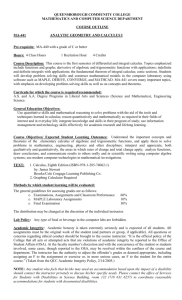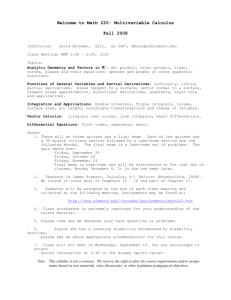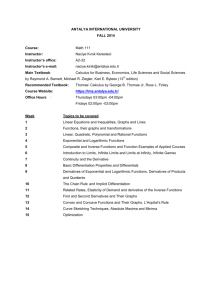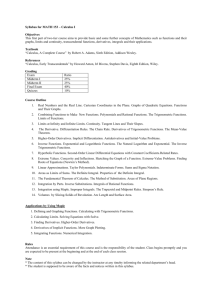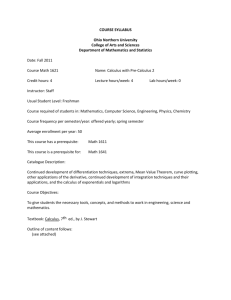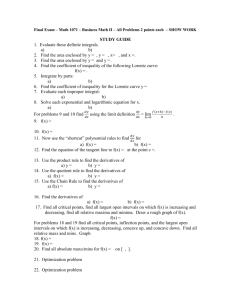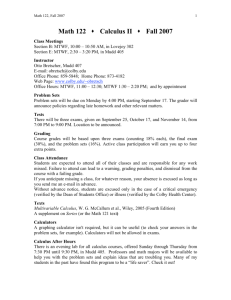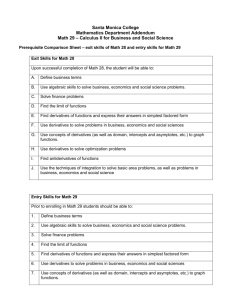msword - Alvin Community College
advertisement
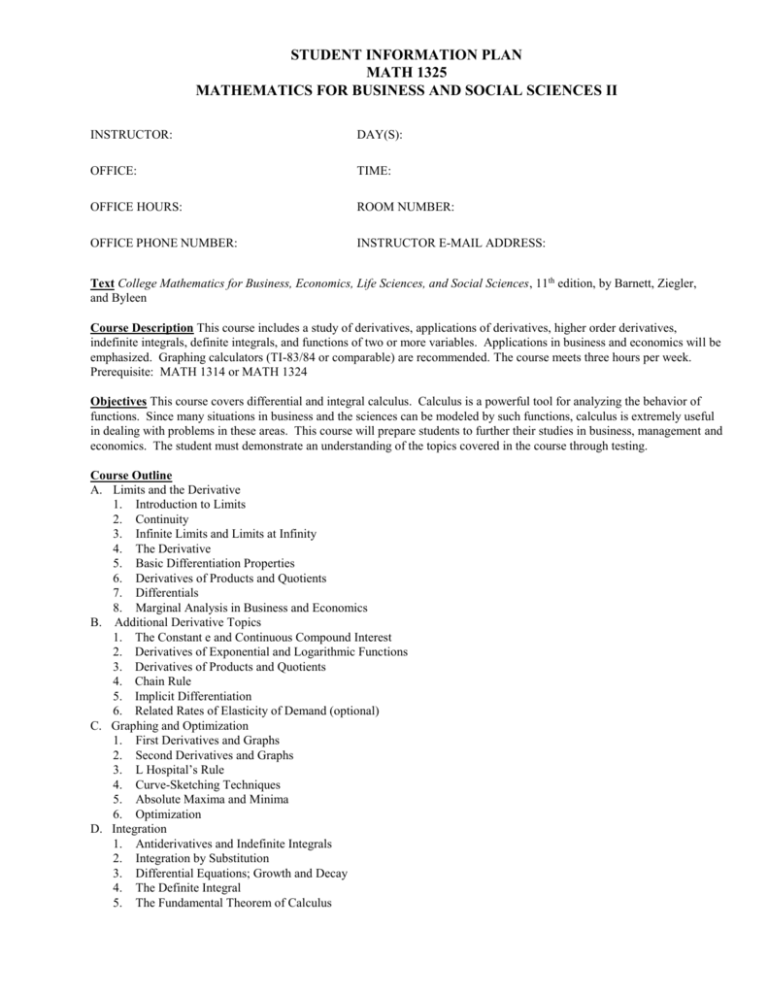
STUDENT INFORMATION PLAN MATH 1325 MATHEMATICS FOR BUSINESS AND SOCIAL SCIENCES II INSTRUCTOR: DAY(S): OFFICE: TIME: OFFICE HOURS: ROOM NUMBER: OFFICE PHONE NUMBER: INSTRUCTOR E-MAIL ADDRESS: Text College Mathematics for Business, Economics, Life Sciences, and Social Sciences, 11th edition, by Barnett, Ziegler, and Byleen Course Description This course includes a study of derivatives, applications of derivatives, higher order derivatives, indefinite integrals, definite integrals, and functions of two or more variables. Applications in business and economics will be emphasized. Graphing calculators (TI-83/84 or comparable) are recommended. The course meets three hours per week. Prerequisite: MATH 1314 or MATH 1324 Objectives This course covers differential and integral calculus. Calculus is a powerful tool for analyzing the behavior of functions. Since many situations in business and the sciences can be modeled by such functions, calculus is extremely useful in dealing with problems in these areas. This course will prepare students to further their studies in business, management and economics. The student must demonstrate an understanding of the topics covered in the course through testing. Course Outline A. Limits and the Derivative 1. Introduction to Limits 2. Continuity 3. Infinite Limits and Limits at Infinity 4. The Derivative 5. Basic Differentiation Properties 6. Derivatives of Products and Quotients 7. Differentials 8. Marginal Analysis in Business and Economics B. Additional Derivative Topics 1. The Constant e and Continuous Compound Interest 2. Derivatives of Exponential and Logarithmic Functions 3. Derivatives of Products and Quotients 4. Chain Rule 5. Implicit Differentiation 6. Related Rates of Elasticity of Demand (optional) C. Graphing and Optimization 1. First Derivatives and Graphs 2. Second Derivatives and Graphs 3. L Hospital’s Rule 4. Curve-Sketching Techniques 5. Absolute Maxima and Minima 6. Optimization D. Integration 1. Antiderivatives and Indefinite Integrals 2. Integration by Substitution 3. Differential Equations; Growth and Decay 4. The Definite Integral 5. The Fundamental Theorem of Calculus E. Additional Integration Topics 1. Area Between Curves 2. Applications in Business and Economics 3. Integration by Parts 4. Integration Using Tables F. Multivariable Calculus (optional) 1. Functions of Several Variables 2. Partial Derivatives 3. Maxima and Minima End of Course Assessment Exam: An assessment exam will be administered at the end of the semester. The exam will be a minimum of 5% of the course grade. Methods of Evaluation 1. Homework 2. Quizzes 3. Exams 4. End of Course Assessment Exam 5. Comprehensive Final Exam Grading System Course Average 90 - 100 80 - 89 70 - 79 60 - 69 Below 60 Grade A B C D F, W, or I Attendance Regular attendance in class is expected. If an absence is unavoidable, the student is responsible for completing all work missed during the absence. Any work missed and not completed may affect the grade of the student regardless of the reason for the absence. Your instructor may initiate administrative withdrawal for a student who exceeds course absence standards (6 hours). Withdrawal from class may affect enrollment in other courses, insurance eligibility, financial aid, and/or veteran’s benefits. It should be noted that ceasing to attend class does not terminate enrollment. Therefore, a student who ceases to attend class without officially withdrawing from that class may receive a failing grade. Classroom Behavior It is expected that students will behave in a mature and courteous manner. Disruptive behavior during class will not be tolerated. Students are expected to be attentive, take notes, ask pertinent questions, arrive on time, and not leave until the class is dismissed. Conflicts which arise between the scheduled class time and the student’s personal schedule must be resolved by the student. Learning Lab/Library Tutoring is offered to students enrolled in MATH 1325 during posted hours in the Learning Lab. The Library and Learning Lab have a copy of the Instructor Solutions Manual (fully worked solutions to all textbook exercises). MyMathLab® MyLathLab® (internet) is a text-specific online course to help you succeed in learning. MyMathLab® contains MathXL® (an online homework, tutorial, and assessment system that is packaged with the textbook when a new textbook is purchased). Students can take chapter tests and receive personalized study plans based on their results. The study plan diagnoses weaknesses and links students to tutorial exercises for objectives they need to study. Students can also access video clips from selected exercises. Academic Honesty A student found guilty of scholastic dishonesty is subject to disciplinary action. Violations such as plagiarism, cheating on tests, and collusion are described in the ACC Student Handbook. Consequences are at the discretion of the instructor and range from receiving zero on the assignment/test to failing the course to expulsion from Alvin Community College. Camcorders Camcorders and any other video recording devices are prohibited in the classroom. Audio may be allowed ONLY WITH THE PERMISSION OF THE INSTRUCTOR. Cellular phones Cell phones are not to be used and are not to ring during the class. Cell phones are not to be out during tests. If there are special circumstances, arrangements must be made with the instructor. ADA Compliance: Alvin Community College will adhere to all applicable federal, state, and local laws, regulations, and guidelines with respect to providing reasonable accommodations as required to afford equal educational opportunity. It is the policy of ACC to provide reasonable accommodations for qualified individuals who are students with disabilities. It is the student’s responsibility to contact the Counseling Center in a timely manner to arrange for appropriate accommodations.
